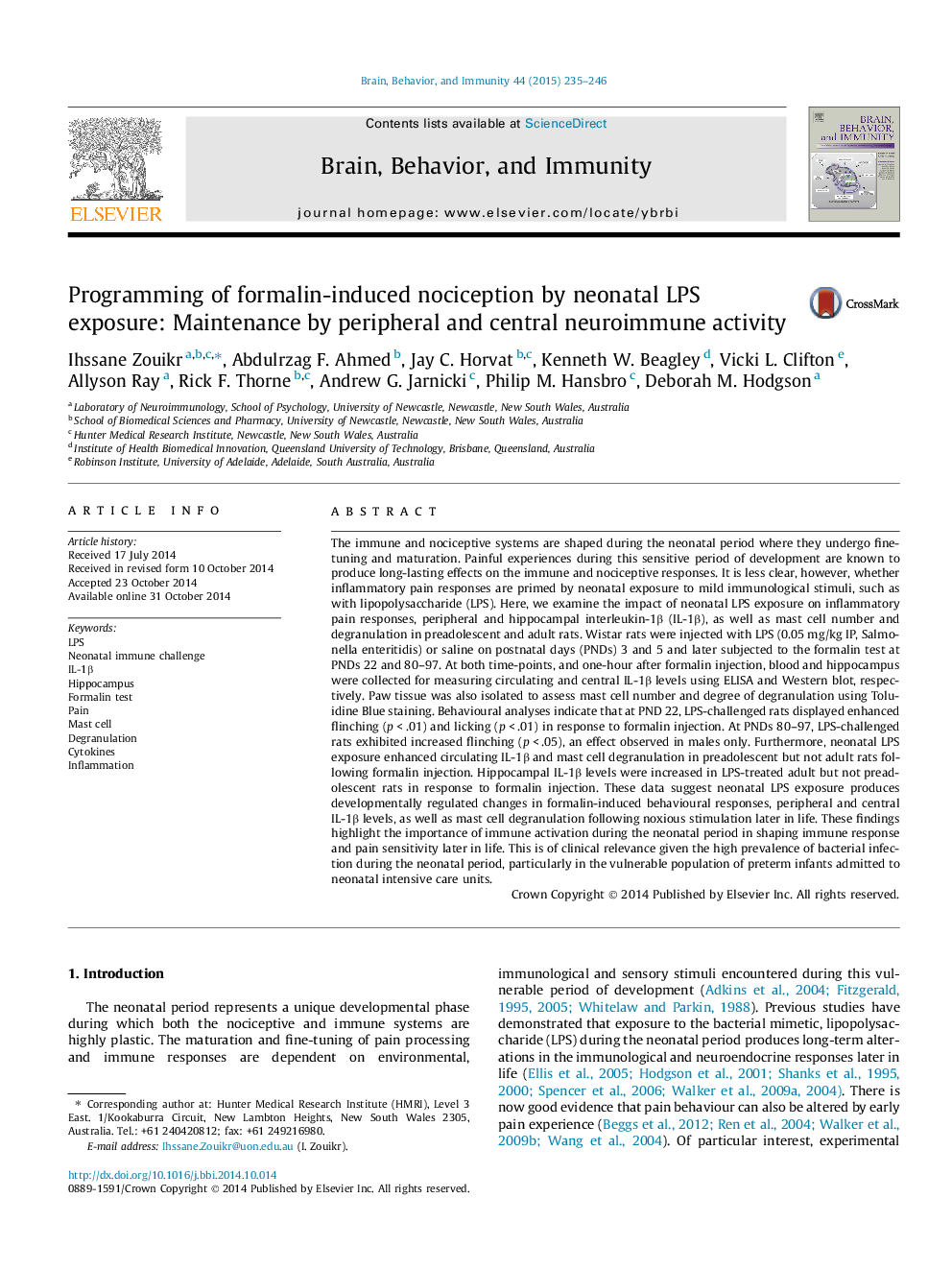| کد مقاله | کد نشریه | سال انتشار | مقاله انگلیسی | نسخه تمام متن |
|---|---|---|---|---|
| 7281428 | 1473923 | 2015 | 12 صفحه PDF | دانلود رایگان |
عنوان انگلیسی مقاله ISI
Programming of formalin-induced nociception by neonatal LPS exposure: Maintenance by peripheral and central neuroimmune activity
ترجمه فارسی عنوان
برنامه ریزی ناخوشایند ناشی از فرمالین با قرار گرفتن در معرض نور آفتاب نوزادان: نگهداری از طریق فعالیت های محیطی و عصبی مرکزی
دانلود مقاله + سفارش ترجمه
دانلود مقاله ISI انگلیسی
رایگان برای ایرانیان
کلمات کلیدی
موضوعات مرتبط
علوم زیستی و بیوفناوری
ایمنی شناسی و میکروب شناسی
ایمونولوژی
چکیده انگلیسی
The immune and nociceptive systems are shaped during the neonatal period where they undergo fine-tuning and maturation. Painful experiences during this sensitive period of development are known to produce long-lasting effects on the immune and nociceptive responses. It is less clear, however, whether inflammatory pain responses are primed by neonatal exposure to mild immunological stimuli, such as with lipopolysaccharide (LPS). Here, we examine the impact of neonatal LPS exposure on inflammatory pain responses, peripheral and hippocampal interleukin-1β (IL-1β), as well as mast cell number and degranulation in preadolescent and adult rats. Wistar rats were injected with LPS (0.05 mg/kg IP, Salmonella enteritidis) or saline on postnatal days (PNDs) 3 and 5 and later subjected to the formalin test at PNDs 22 and 80-97. At both time-points, and one-hour after formalin injection, blood and hippocampus were collected for measuring circulating and central IL-1β levels using ELISA and Western blot, respectively. Paw tissue was also isolated to assess mast cell number and degree of degranulation using Toluidine Blue staining. Behavioural analyses indicate that at PND 22, LPS-challenged rats displayed enhanced flinching (p < .01) and licking (p < .01) in response to formalin injection. At PNDs 80-97, LPS-challenged rats exhibited increased flinching (p < .05), an effect observed in males only. Furthermore, neonatal LPS exposure enhanced circulating IL-1β and mast cell degranulation in preadolescent but not adult rats following formalin injection. Hippocampal IL-1β levels were increased in LPS-treated adult but not preadolescent rats in response to formalin injection. These data suggest neonatal LPS exposure produces developmentally regulated changes in formalin-induced behavioural responses, peripheral and central IL-1β levels, as well as mast cell degranulation following noxious stimulation later in life. These findings highlight the importance of immune activation during the neonatal period in shaping immune response and pain sensitivity later in life. This is of clinical relevance given the high prevalence of bacterial infection during the neonatal period, particularly in the vulnerable population of preterm infants admitted to neonatal intensive care units.
ناشر
Database: Elsevier - ScienceDirect (ساینس دایرکت)
Journal: Brain, Behavior, and Immunity - Volume 44, February 2015, Pages 235-246
Journal: Brain, Behavior, and Immunity - Volume 44, February 2015, Pages 235-246
نویسندگان
Ihssane Zouikr, Abdulrzag F. Ahmed, Jay C. Horvat, Kenneth W. Beagley, Vicki L. Clifton, Allyson Ray, Rick F. Thorne, Andrew G. Jarnicki, Philip M. Hansbro, Deborah M. Hodgson,
